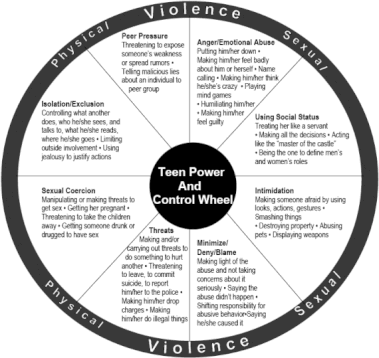
Hello,
February is Teen Dating Violence Awareness Month. It is so important to shed light on this issue. Abusive relationships can start early. Pre-teens are even acknowledging that there is abuse in their relationships. Domestic violence is a growing epidemic. If we can educate people when they are young, then we can prevent future instances of domestic violence.
The Teen Power and Control Wheel holds valuable information. Remember, domestic violence is all about gaining power and control over the other person. Abuse isn’t only physical, it can be emotional, sexual, or verbal. This wheel shows the warning signs to look for in a relationship. As you look at each section on the wheel, notice how it deals with gaining control of the other person.
I am currently writing a novel called Denial that deals with teen dating violence. I’ll use Denial to show examples of each type of abuse.
Anger/Emotional Abuse-In Denial, the main character, Ashley, struggles with Troy’s, her boyfriend, put downs, anger outbursts, and guilt trips. He brushes off her concerns of problems within their relationship by making her feel that it is all in her head.
Using Social Status-Troy makes the decisions in the relationship. He decides who they spend time with. Ashley and her best friend, Maria, become distanced by the wedge Troy puts between their friendship.
Intimidation-Troy gains control over Ashley over time. At first their relationship seemed ideal in her eyes. Soon, Troy demands that he get his way, and starts to use physical control by grabbing her arm and pushing her.
Minimize/Deny/Blame-This is a favorite tactic by an abuser. Noting is ever his or her fault. Troy will dismiss Ashley’s concerns about their relationship by making her feel that she is making a big deal about nothing. He tells her the issues are her fault, using her depression as a reason why she feels the way she does.
Threats-Another common way abusers control their victim is by threatening them. They could threaten to do the other harm, threaten to leave, or threaten to commit suicide, all in the effort to control the other person. Troy makes threats throughout Denial, including threatening to ruin her reputation.
Sexual coercion-This type of abuse involves either manipulating or forcing the victim to have sex or getting the victim pregnant. Also, someone who is drunk cannot consent to have sex, and if the abuser gets the victim drunk and has sex, this is rape. In Denial, we see signs of sexual assault.
Isolation/Exclusion- Early in Denial, Troy isolates Ashley from her friends. This is a classic abuse tactic. He makes it almost impossible for her to even talk to other students, especially males, because he claims to get jealous. He isolates Ashley and cuts her off from her support system.
Peer Pressure-Threatening to keep someone in a relationship or to return to the relationship through threats to expose or lie is abusive. Troy spreads rumors about Ashley and tells her that he will stop if she will take him back.
These tactics are manipulative and controlling and all are red flags in a relationship. These signs can relate to any age group, but are more specific to teens. Anyone experiencing these signs could be in an abusive relationship.
If you are aware of these signs, you will be able to see when an abusive relationship exists, whether it is your own or a family member or friend. Please seek help from a domestic violence organization or a school counselor. If you are a victim, reach out for help. It is available. If you are a bystander, you can guide the abused to the right people to talk to. You might save a life.
I hope the signs of an abusive relationship are more clear now. The perpetrator can be very good at covering his/her abusive tactics, but knowing these signs will help you to recognize the abuse.
Remember, if we can help just one person, we’ve done our job.
Take care,
Katelin Maloney
www.purpleribbonpublishing.com
Please note: If you are in an abusive relationship, please reach out to your local domestic violence organization or call the National Domestic Violence Hotline at 800-799-7233.
 RSS Feed
RSS Feed